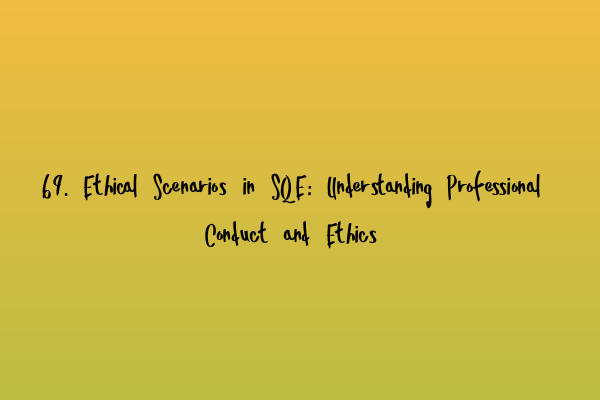69. Ethical Scenarios in SQE: Understanding Professional Conduct and Ethics
Welcome to another blog post in our ongoing series on SQE Exam Law. In today’s post, we will delve into the ethical scenarios that you may encounter in the SQE exams and discuss the importance of understanding professional conduct and ethics.
Before we dive deep into this topic, let’s quickly recap what SQE Exam Law is. The Solicitors Qualifying Examination (SQE) is a two-part examination that all aspiring solicitors must pass to qualify in England and Wales. The ethics element of the SQE focuses on professional conduct and ethics, which is an integral part of being a solicitor.
Professional conduct and ethics are crucial for solicitors as they help maintain the integrity of the legal profession, protect clients’ interests, and promote trust in the justice system. As an aspiring solicitor, it is vital for you to fully understand the ethical obligations and responsibilities that come with the practice of law.
Now, let us explore some ethical scenarios that you may encounter in the SQE exams:
Scenario 1: Conflict of Interest
One of the most common ethical scenarios you may encounter is a conflict of interest. This occurs when a solicitor’s duty to one client conflicts with their duty to another. For example, imagine you are representing two co-defendants in a criminal case, and one client confesses to the crime while the other denies any involvement. How would you handle this conflict and ensure fair representation for both clients?
To successfully navigate this scenario, you would need to identify the conflict and discuss the options with your clients. You might suggest obtaining separate legal representation to prevent any potential conflicts or withdrawing from the representation of one of the clients if it becomes unmanageable. Your ethical duty is to prioritize the best interests of your clients while maintaining your professional integrity.
Scenario 2: Confidentiality
Confidentiality is another essential aspect of the solicitor-client relationship. As a solicitor, you have a legal and ethical duty to maintain confidentiality and protect your clients’ information. In some cases, you may encounter a scenario where disclosing client information becomes necessary, such as when there is a risk of harm to others or if required by law.
Consider a situation where a client discloses their intention to commit a crime that may harm others. In such cases, you must balance the duty of confidentiality with the potential harm and consider whether to breach confidentiality to prevent harm or notify the appropriate authorities responsibly.
Scenario 3: Cultural Sensitivity and Diversity
As the legal profession becomes increasingly diverse, cultural sensitivity and respect for diversity are crucial. In the SQE exams, you may encounter scenarios where you must navigate cultural sensitivities while adhering to your ethical obligations.
For instance, imagine you are advising a client who comes from a different cultural background and requires legal advice that conflicts with your personal beliefs. How would you handle this situation while honoring your ethical duty?
In such scenarios, it is important to set aside personal biases and treat all clients with respect and fairness. Your ethical duty as a solicitor is to provide competent and unbiased advice, regardless of your personal beliefs or cultural differences.
Scenario 4: Professional Boundaries
Maintaining professional boundaries is essential to establish trust and ensure effective representation. In the SQE exams, you may encounter scenarios where you need to establish and maintain appropriate professional boundaries.
For instance, let us consider a scenario where a client develops romantic feelings towards you and expresses a desire to pursue a personal relationship. How would you handle this situation while maintaining professional boundaries and upholding your ethical duties?
In such cases, it is crucial to maintain a professional and ethical distance, clearly communicate the boundaries, and prioritize the client’s legal interests. Engaging in a personal relationship with a client could compromise their trust in your professional judgment and create conflicts of interest.
Conclusion
Understanding professional conduct and ethics is a fundamental aspect of becoming a solicitor. By exploring these ethical scenarios, we hope to highlight the importance of ethical awareness and decision-making in the SQE exams and beyond.
If you found this blog post helpful, be sure to check out our related articles:
- Conquer the Multiple Choice Questions (MCQ) in SQE1
- Mastering Effective Revision Techniques for SQE Success
- Interactive mock tests for SQE: Enhancing engagement and learning
- SQE Sample Papers: Practice for Exam Success
- Focus Areas in SQE1 and SQE2: Mastering Key Concepts
Thank you for reading! Stay tuned for more informative articles on SQE Exam Law.
